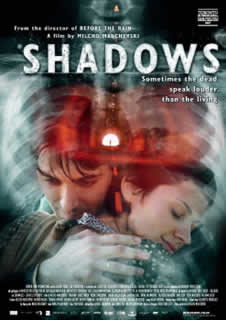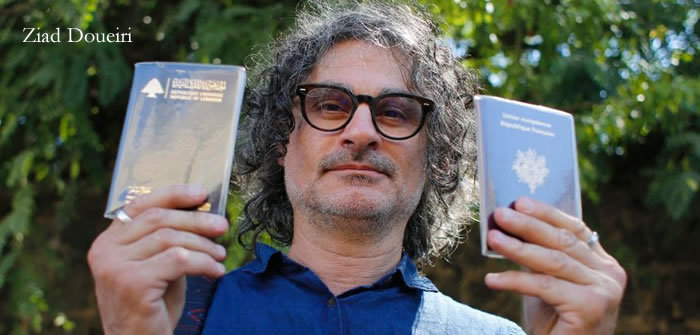 Roger Durling has been at the helm of the Santa Barbara International Film Festival for the past five years. He was born and raised in Panama and has a graduate degree from Columbia University. He has been teaching Film Studies at Santa Barbara City College for the past three years. He writes a column about film entitled Roger Durling¹s THE BIG PICTURE in Santa Barbara¹s weekly paper the Independent and serves on the Board of Directors of Santa Barbara’s Downtown Organization. In 2004, he was recognized as Santa Barbara¹s Citizen of the Year.
Roger Durling has been at the helm of the Santa Barbara International Film Festival for the past five years. He was born and raised in Panama and has a graduate degree from Columbia University. He has been teaching Film Studies at Santa Barbara City College for the past three years. He writes a column about film entitled Roger Durling¹s THE BIG PICTURE in Santa Barbara¹s weekly paper the Independent and serves on the Board of Directors of Santa Barbara’s Downtown Organization. In 2004, he was recognized as Santa Barbara¹s Citizen of the Year.
Bijan Tehrani:
Congratulations on a wonderful 2008 festival. How was this year? Did you see any progress made from 2007?Roger Durling (Director of Santa Barbara International Film Festival): Well, it definitely felt bigger to me in every which way. We had far more films screened than we had in the past and far more countries represented. There were forty-six countries represented in the festival. We had far more filmmakers in attendance from different countries so it definitely, to me, seemed bigger. Despite the rain—we had several rainy days where we had to turn people away at screenings in which we were at capacity. I mean, it feels good it and it feels like it has definitely grown.
BT: With the growth of the presence of international cinema at the festival, was this because of audience demand or was it a goal of the festival to create a focus on international cinema?
RD: It was a focus of the festival, definitely. We have seen a growing demand on foreign films in every way. We emphasized this year Eastern European films, and the Latino section in the festival has been expanded. Since I took over the film festival five years ago, I have been taking the international part of the festival very seriously. We’ve made a big effort to expand that section.
BT: How has this festival helped filmmakers from other countries by screening their films?
RD: We tend to pick films that have not been in the festival circuit too much. I am going to use the example of the film that won Best Foreign film this year, Beautiful Bitch from Germany. It was the U.S. premiere and it has barely been seen in festivals, and it won. Now it is off to Berlin and off to different festivals. The filmmaker was here and he was very happy because it was exposure that he normally wouldn’t have received for this small film from Germany. I feel good about that. We’re not a market film festival like Sundance; we are more of a showcase where we feature these films that normally wouldn’t have had light shined upon them. They are not going to be shown here in our local DVD store or Netflix. This is a good chance for them to get seen.
Beautiful Bitch from Germany. It was the U.S. premiere and it has barely been seen in festivals, and it won. Now it is off to Berlin and off to different festivals. The filmmaker was here and he was very happy because it was exposure that he normally wouldn’t have received for this small film from Germany. I feel good about that. We’re not a market film festival like Sundance; we are more of a showcase where we feature these films that normally wouldn’t have had light shined upon them. They are not going to be shown here in our local DVD store or Netflix. This is a good chance for them to get seen.
BT: How much do you think it will help the American filmmakers, and students especially, to see work from other countries? RD: Absolutely. It helps students big-time. We have a big educational aspect to the film festival. There was a film festival class, and there were hundreds of kids attending the festival. We bussed 3,000 kids from the neighboring schools on the mornings of the festival and made the films accessible. On the weekends, for free, families were able to attend early showings at 9 a.m. screenings of the festival. I don’t know if you noticed, but during the red carpet event there was this teen press. Kids were interviewing and they had been doing it throughout the festival. The kids were hands-on in interviewing filmmakers and stars that were here at the festival.
RD: Absolutely. It helps students big-time. We have a big educational aspect to the film festival. There was a film festival class, and there were hundreds of kids attending the festival. We bussed 3,000 kids from the neighboring schools on the mornings of the festival and made the films accessible. On the weekends, for free, families were able to attend early showings at 9 a.m. screenings of the festival. I don’t know if you noticed, but during the red carpet event there was this teen press. Kids were interviewing and they had been doing it throughout the festival. The kids were hands-on in interviewing filmmakers and stars that were here at the festival.
BT: Did you have any type of tribute to international filmmakers or did you have any in the past?
RD: We had Javier Bardem this year. He is one of the biggest European and international stars. The focus when it comes to tributes is attached to Academy nominees and that is basically why we have gotten so much media attention; we open two days after the Academy nominations are announced and that is why people like Cate Blanchett, Javier Bardem, and Tommy Lee Jones were featured in the festival. That is basically our signature—but I love international cinema. I am from Panama and I was born and raised there, so I love international cinema. However, our tributes are focused on academy award nominees and Javier Bardem also happens to fit into that niche.
BT: At Cinema Without Borders, we admire the taste of the festival in regards to the international films that are chosen. Some of the international films that you choose are great films that have not been picked by any other festival so they have not had a chance of being seen at other venues. Other festivals try to bring in films that have been showcased at Cannes and Berlin but I think last year you had films from the Czech Republic, and this year from other countries that have had no other chance if they are not showcased here.
not had a chance of being seen at other venues. Other festivals try to bring in films that have been showcased at Cannes and Berlin but I think last year you had films from the Czech Republic, and this year from other countries that have had no other chance if they are not showcased here.
RD: That is a goal of ours to bring films that are not in the festival circuit. I am not interested in showing you the film that is the Academy Award submission from that country, but I want that rare, small, deserving, film from Poland that audiences should be aware of. I am glad you feel that way. We are very proud of that. The Latin American films and Spanish films that we showcase are not very mainstream in the festival circuit. I tell my programmers that it is not our job to feed into a certain audience’s taste, but to broaden the audience’s horizons and open them up to new things; you know, being in the forefront as opposed to catering to specific tastes.
BT: What do you hope for the next year?
RD: We’ll continue what we do. The whole aspect of the celebrity tributes that we do, brings us sponsors and media attention and with that comes financial health. I use that money to bring more international directors to showcase their films and be here during the film festival. I hope to continue growing the festival in stature and bring more directors over. The festival definitely has room to grow. Last year, we were named one of the Top Fifty Film Festivals by “Variety” Magazine and there were only twelve Americans in that list. I just wish to continue to grow the festival’s prestige.
BT: What do you think about Cinema without Borders?
RD: I really like Cinema Without Borders’ interviews. Most of the websites that cover film focus too much on American Cinema, movie stars, and gossip. To me, it’s refreshing to see a website that dedicates itself, truly, to international cinema and news that is more about directors, writers, and what’s going on in international—and world cinema—for real.
BT: Thank you! I wish you great success in the future.

